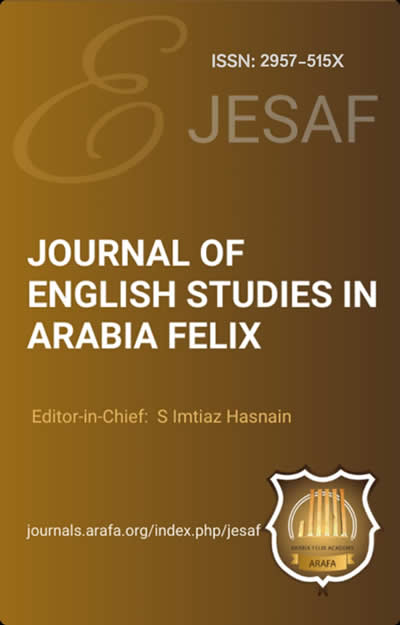OUR JOURALS

Journal of English Studies in Arabia Felix (JESAF) (ISSN: 2957-515X) is a peer-reviewed international forum for theoretical and practical research pertinent to English language studies within the realm of linguistics, literature, and pedagogy. It is home to contributions of a scholarly nature that promote understanding of the field. The journal accepts papers with appropriate evidence and theories of contemporary issues of concern to the readership. Book reviews and review articles relevant to the scope of the journal are also welcome.
JESAF gains a foothold in Yemen (previously Arabian Felix) and opens to the world. It encourages submissions, without discrimination, from anywhere in the world. The JESAF audience primarily includes teachers, researchers, students and all kinds of the public who, directly or indirectly, are interested in language learning and teaching, English literature, and relevant educational issues.
The journal is published in an open-access format twice a year (June and December). However, submissions are not subject to a deadline. We accept and publish submissions on a continuous mode to reduce the time spent waiting for an issue to be published. Once an article is accepted, it is published on the JESAF website with DOI and URL.
Editor-in-Chief: S. Imtiaz Hasnain, AMU, India
Presubmission Inquiry
Manuscript submission and publication is a long and tedious process. Authors may have to wait for several weeks before they get to know a decision about their submissions. Through ARAFA services you can save your time and effort in terms of the period you spend since submission to publishing your papers. Prior to submitting your manuscripts, you can send pre-submission inquiry about your submission to knew whether the journal would be interested in your manuscript or your papers fall within its scope.
If authors are unsure about whether your manuscript is indeed a good fit for the journal, authors can write to the editor(s) prior to submission to demonstrate how their work would be a good fit for the journal.
Our editors form a view about submissions without going through the entire manuscript and give provide an early feedback regarding a desk rejection and in this way authors save their precious time and effort. Editors give prospective authors feedback on how to improve their papers. They can also suggest some other journals that may be a good fit for their submission.
If authors get positive feedback, they will be more confident about their chances of getting their paper accepted for further consideration.
